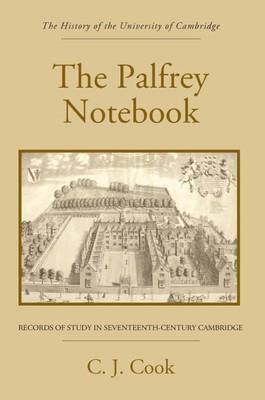
- Afhalen na 1 uur in een winkel met voorraad
- Gratis thuislevering in België vanaf € 30
- Ruim aanbod met 7 miljoen producten
- Afhalen na 1 uur in een winkel met voorraad
- Gratis thuislevering in België vanaf € 30
- Ruim aanbod met 7 miljoen producten
Zoeken
The Palfrey Notebook
Records of Study in Seventeenth-Century Cambridge
€ 257,95
+ 515 punten
Omschrijving
Fully annotated edition of a Cambridge student's notebook from the seventeenth century sheds important light on developments in philosophy during the period, as well as on the structure and content of a university education. The Palfrey Notebook is a unique survival from the early seventeenth century. Compiled in around 1623 by George Palfrey of Sidney Sussex College, Cambridge, probably as a record of his studies for his Master's degree, it covers many of the widely-used texts of the period. Although primarily devoted to a detailed evaluation of Aristotelian natural philosophy, it includes an extended survey of the literature on Natural Magic, records of orations and disputations (including Palfrey's own) delivered in college or at the Schools, notes on logic and ethics, personal notes, and anti-papal diatribe. Since the Master of the college at the time was the renowned, moderate-Calvinist scholar Samuel Ward, Palfrey's views, as reflected in the Notebook, can be taken to represent this aspect of Anglicanism, although most of the sources are Roman Catholic, specifically Jesuit texts.
A full transcript of the Notebook ispresented here, with detailed commentary and extensive notes which illuminate Palfrey's material and explain its relationship to contemporary texts. A substantial introduction places the Notebook in its historical, educational andphilosophical contexts, examines the apparent contradictions between Palfrey's Aristotelianism and interest in magic, his Calvinism and use of Jesuit material, and suggests that the notebook represents a coherent response to thesocial and intellectual challenges of the times. C. J. Cook holds a Doctorate in the History of Philosophy from Cambridge University.
A full transcript of the Notebook ispresented here, with detailed commentary and extensive notes which illuminate Palfrey's material and explain its relationship to contemporary texts. A substantial introduction places the Notebook in its historical, educational andphilosophical contexts, examines the apparent contradictions between Palfrey's Aristotelianism and interest in magic, his Calvinism and use of Jesuit material, and suggests that the notebook represents a coherent response to thesocial and intellectual challenges of the times. C. J. Cook holds a Doctorate in the History of Philosophy from Cambridge University.
Specificaties
Betrokkenen
- Uitgeverij:
Inhoud
- Aantal bladzijden:
- 818
- Taal:
- Engels
- Reeks:
- Reeksnummer:
- nr. 7
Eigenschappen
- Productcode (EAN):
- 9781843836667
- Verschijningsdatum:
- 15/12/2011
- Uitvoering:
- Hardcover
- Formaat:
- Genaaid
- Afmetingen:
- 157 mm x 239 mm
- Gewicht:
- 1587 g

Alleen bij Standaard Boekhandel
+ 515 punten op je klantenkaart van Standaard Boekhandel
Beoordelingen
We publiceren alleen reviews die voldoen aan de voorwaarden voor reviews. Bekijk onze voorwaarden voor reviews.










